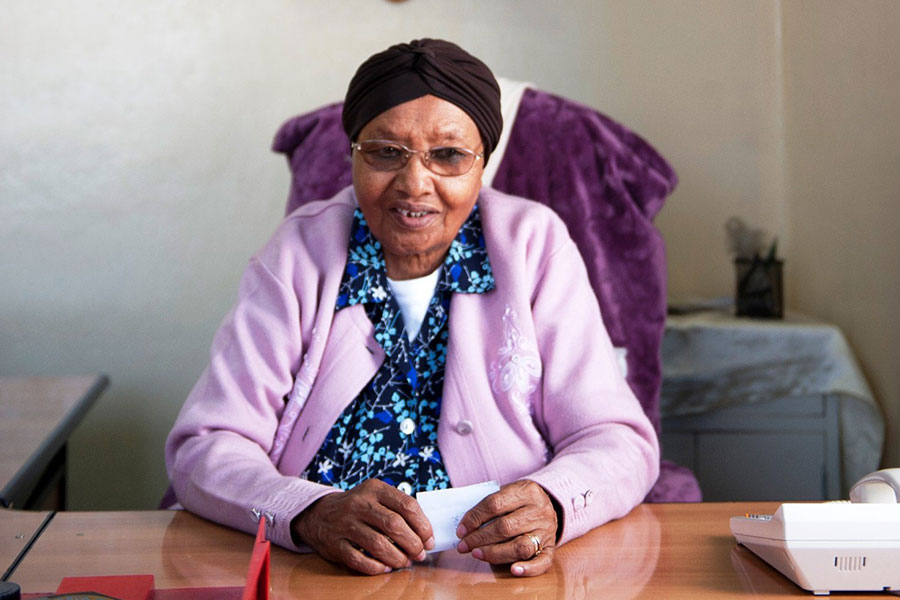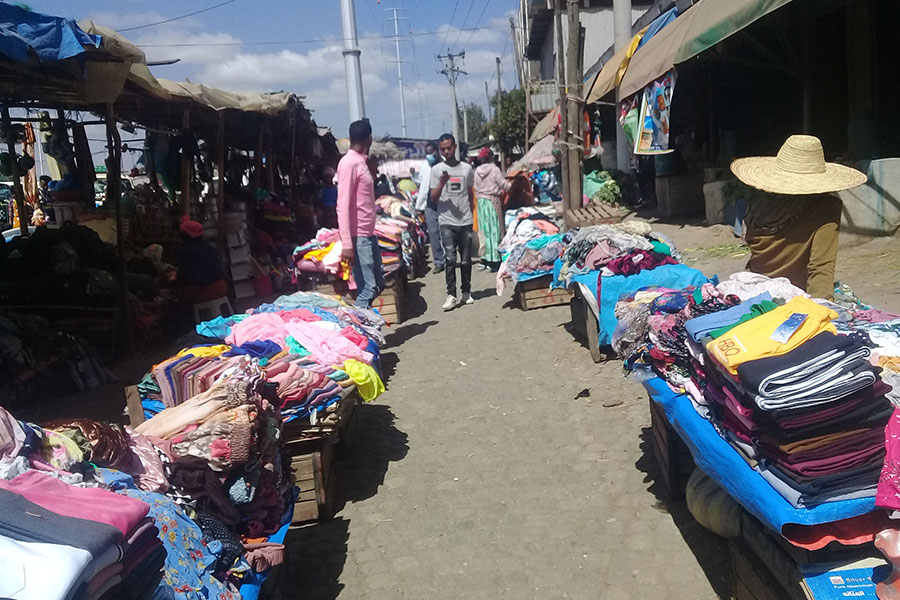
Apr 16 , 2022
By HAWI DADHI
Central bank regulators are set to introduce a bill that will allow foreign investors and overseas companies unrestricted opportunities in digital financial services. The draft proclamation comes following a pledge by federal officials last year to open up the market to foreign capital.
Companies applying for licenses are required to establish a subsidiary for digital financial services and pay licensing fees in foreign currency. Says the draft proclamation: "Foreign nationals and Ethiopian entities fully owned by foreign nationals can invest in a payment instrument issuer or payment system operator business only through foreign direct investment and in an acceptable foreign currency."
The bill designates subsidiaries as share companies wholly controlled or significantly owned by a local or foreign parent company, registered in Ethiopia and operating from a head office in the country. Experts say the requirement to form a subsidiary company will allow the central bank to enforce stringent regulatory measures better and avoid the duplication of supervision by other federal agencies.
Safaricom Ethiopia Plc is likely to be one of the frontrunner beneficiaries of the changes, which will allow it to introduce its powerful and popular platform, M-Pesa mobile money, to the Ethiopian market. M-Pesa began operations in Kenya in 2007, with acclaimed success in transforming the payment system in the neighbouring country. It facilitates transactions valued at over 780 million dollars a day.
If the bill is approved by the Council of Ministers and ratified by Parliament, the telecom operator will be required to establish a domestic subsidiary company and pay a license fee in foreign currency. Safaricom Ethiopia was granted a 15-year full telecom operator license last year after bidding 850 million dollars.
Last month, a team of officials and experts from the National Bank of Ethiopia (NBE) paid visits to Kenya and Tanzania, the latter where Safaricom expanded its presence.
For years, regulatory roadblocks have limited fintech companies to technology suppliers working with commercial banks. The proposed regulatory changes are also good news for foreign-owned fintech companies already operating in Ethiopia or considering an expansion into an untapped market. Mobile money pioneers Hellocash and M-Birr - both owned by foreign companies - have partnered with commercial banks and microfinance institutions to provide their services. The new rules would allow these firms to begin the business independently.
Another fintech company eyeing the Ethiopian market is the Nigeria-based Paga, established in 2006 by Tayo Oviosu. Paga-Ethiopia, part of the Paga Group, recently inked a deal with the Bank of Abyssinia to develop payment solutions. The Group operates payment facilities serving around 19 million customers.
"We've got the interest and the ability to enter," Adam Abate, chief executive officer (CEO) of Paga-Ethiopia, told Fortune. "The only setback was the regulatory restrictions.”
Adam confirmed that the company would apply for a digital financial services provider license after the bill is signed into law.
The bill surfaces two years after the central bank issued directives to govern the operation of payment system operators and instrument issuers. Three firms – the state-owned Ethio telecom, ArifPay, and SunPay – have been issued licenses since. The former's Telebirr mobile money platform has registered over 15 million users and facilitated transactions valued at more than five billion Birr since its launch last year. ArifPay surpassed one million Birr in transactions last week.
Digital financial services are thriving in Sub-Saharan Africa. It is home to over half of the 300 mobile money services globally. No less than five sub-Saharan African countries have five or more mobile money services operating in their respective markets. Kenya has five and a staggering 17 in Nigeria. MTN (MoMo), Airtel, Safaricom (M-Pesa), and Orange (Orange Money) are a few of the biggest brands in the payments system sector. Last week, MTN, a South African telecom operator in the business for nearly three decades, received a nod from the Nigerian central bank to introduce its MoMo mobile money platform to the largest market in Africa.
Industry players say Ethiopia has an even larger appetite for digital financial services. Operators can run their network of agents and devices, including automated teller (ATMs) and Point of Sales (POS) machines that can be used for multiple purposes and switches or payment gateways.
"It's about channelling money, selling extra services and entering the space of micro and mezzo loans," said Vincent Diop, CEO of BelCash.
A Dutch company, BelCash owns Hellocash, which has previously partnered with Lion Bank, and Somali Microfinance . Its executives are keen to take advantage of the market opening. According to Vince, the company may look into acquiring a payment gateway operator license initially. Established in 2015, Hellocash operates with 12,000 agents and facilitates daily transactions of around 450 million Br from over 2.1 million users.
"It's only the start of a new journey for the Ethiopian financial sector," said Vince.
Although the draft proclamation proposes to allow foreign companies to enter the market, licensing fees have yet to be set. Regulators say upcoming directives will determine the fees and which companies have the financial capability to be granted entry. Although the move is seen as positive by entrants, local fintech companies are wary that it will debilitate emerging local companies.
Nurhassen Mudessir, the managing partner of YenePay Financial Technologies, believes the timing could not be more wrong. It has only been a year since fintech companies gained legal recognition. He contends that local companies should be granted safeguards to grow and attain competitiveness before the market is opened to foreign firms.
"It's impossible to compete with big companies investing millions of dollars," Nurhassen told Fortune.
Experts share the concerns.
Endashaw Tesfaye leads digital programming at the United Nations Capital Development Fund (UNCDF). He observed that the prevailing lack of capacity - and will - sideline banks and payment instrument issuers if foreign firms enter the market. The expert foresees Ethio telecom's Telebirr as the primary contender to M-Pesa as it is the only company with deep pockets to challenge. Other players do not; they will have complementary roles, according to Endashaw.
He does, however, see that the entrance of foreign firms will create exposure for local companies.
Martha Hailemariam, director of payment and settlement systems at the central bank, declined to comment but disclosed that the draft proclamation will be presented to relevant parties for discussions. Sources disclosed representatives of banks, Ethio telecom and Safaricom had convened to discuss the topic two weeks ago.
An expert working for one of the commercial banks, who spoke to Fortune on conditions of anonymity, sees the bill as a significant leap for the financial sector. He praised the opening up of the market, arguing that it presents an opportunity for banks and fintech companies as those who have strong products can attain previously restricted investments in foreign capital. Banks can also partner with payment operators and expand their digital financial services.
The Ethiopian market is not without its caveats. Cash transactions dominate it, and a large segment of the public either lacks the means of access to digital financial services or is unwilling to subscribe to them. The market has yet to adopt a commission-based model where users are charged a percentage for their transactions. These setbacks might make it challenging for foreign entrants, cautions the expert. He concedes that if they can invest a considerable amount of money, they might be able to overcome these challenges.
"They might have the upper hand in remittance services," he said. "They already have established networks in the global scene."
Regulatory uncertainty also presents a challenge. The central bank is infamous for frequently altering rules to enforce transaction limits, making the market volatile.
"The regulator should enhance its capability and put robust anti-money laundering mechanisms in place," said the expert.
PUBLISHED ON
Apr 16,2022 [ VOL
23 , NO
1146]

Sunday with Eden | May 23,2021

Fortune News | May 29,2021

Obituary | Jul 11,2021

Featured | Oct 23,2021

Fortune News | Jun 24,2023

Fortune News | Oct 21,2023

Radar | Dec 25,2021

Viewpoints | Jul 13,2020

Radar | Jul 11,2021

Fortune News | Oct 14,2023

Dec 22 , 2024 . By TIZITA SHEWAFERAW
Charged with transforming colossal state-owned enterprises into modern and competitiv...

Aug 18 , 2024 . By AKSAH ITALO
Although predictable Yonas Zerihun's job in the ride-hailing service is not immune to...

Jul 28 , 2024 . By TIZITA SHEWAFERAW
Unhabitual, perhaps too many, Samuel Gebreyohannes, 38, used to occasionally enjoy a couple of beers at breakfast. However, he recently swit...

Jul 13 , 2024 . By AKSAH ITALO
Investors who rely on tractors, trucks, and field vehicles for commuting, transporting commodities, and f...

Nov 1 , 2025
The National Bank of Ethiopia (NBE) issued a statement two weeks ago that appeared to...

Oct 25 , 2025
The regulatory machinery is on overdrive. In only two years, no fewer than 35 new pro...

Oct 18 , 2025
The political establishment, notably the ruling party and its top brass, has become p...

Oct 11 , 2025
Ladislas Farago, a roving Associated Press (AP) correspondent, arrived in Ethiopia in...